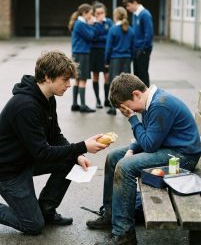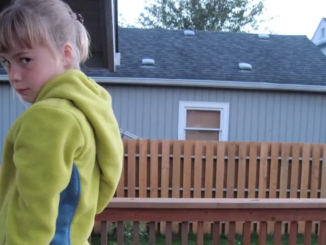It was just a Tuesday.
The kind of Tuesday where the clouds hang low, unsure whether they want to rain or drift off in confusion. I’d just stepped outside, cradling a cup of coffee in one hand and mentally running through a checklist of things I’d likely forget anyway, when I noticed the blue bin.
It sat smack in the middle of our backyard, where our patchy lawn met the cracked edge of a forgotten stone path. I squinted. That bin hadn’t been outside yesterday. In fact, if my memory served me, that specific blue plastic container had been tucked away in the attic—filled with old winter coats and a broken-down air mattress. But here it was now, gleaming under the soft morning sun, and beside it sat Avery.
My nine-year-old had a concentration face he wore when building Legos or picking out the marshmallows from cereal. He had it on now, except this time, he was gently patting the earth inside the bin and dribbling water from a rusted can with almost religious care.
“What are you growing in there, buddy?” I asked, trying not to startle him.
Without looking up, he replied, “Not growing. Feeding.”
I chuckled. “Feeding what? That bin?”
“No,” he said, his voice soft, distant. “I’m gonna feed her strawberries.”
I raised an eyebrow. “Her?”
Now he looked up, his blue eyes solemn. “She wants me to water them daily and pull out the weeds. Says it’s gonna make for a good harvest.”
I felt my smile falter. “Who’s ‘she,’ Ave?”
He paused just long enough to make it feel deliberate. Then: “The girl who used to live in this house. The one who didn’t get to finish her garden.”
That stopped me. We’d moved into the old house on Miller Street just four months ago. The backyard had been a mess—brittle grass, a rusty swing set that squeaked like it had secrets, and nothing remotely resembling a garden.
“There was no garden here before, bud,” I said, gently.
He nodded. “Not anymore. But she had one. Said it was right where the strawberries are now.”
I opened my mouth, then closed it again. It wasn’t like Avery to make up stories. He wasn’t the type. He read mystery books, sure, but he liked facts—bugs, birds, weather patterns. If he was telling me a girl used to live here and plant strawberries, then as far as he was concerned, it was true.
That afternoon, I found a note tucked in the soil.
It wasn’t in his handwriting. The letters were looped and flowery, written in purple pen. It simply said:
“Thank you for remembering me.”
I sat with that note for a long time. Maybe Avery had a friend over I didn’t know about. Or maybe he’d found something in the attic—an old photo, a diary—and his mind had built a story around it. Still, something about the earnestness in his eyes stuck with me.
I brought it up casually the next evening over dinner.
“Ave,” I said, stabbing my fork into a meatball, “this girl you mentioned… how’d you meet her?”
He shrugged. “She was outside one day. She saw me playing and said she used to live here. She asked if she could just sit and look at the yard for a while.”
I narrowed my eyes. “Did she say her name?”
“No. But she was nice. She brought me gum. The strawberry kind.”
“And when was this?”
“I don’t know. Like, a few weeks ago.”
“You didn’t think to tell me someone was visiting?”
He looked guilty. “She said not to. Said grown-ups wouldn’t understand.”
And maybe she was right.
That weekend, curiosity got the better of me. I stopped by the house next door—Mrs. Langley’s place—and asked if she remembered the previous owners. Her eyes lit up.
“Oh, the Grey family! Such a tragedy. The mother, Elena, was sweet as honey. She used to plant strawberries out back with her daughter every spring. That little girl adored them.”
My heart skipped. “What happened?”
She lowered her voice. “Fire. Electrical. Killed both parents. The girl was staying with a friend that night—thank God—but the bank foreclosed not long after. Poor thing ended up in foster care. I heard a relative came and took her in, but they had to move to a small apartment across town.”
Her words clung to me the whole drive home.
That evening, I watched Avery from the kitchen window. He was humming to himself, pulling weeds from the bin, and humming like it was a lullaby meant for someone else.
The next day, she showed up.
I was in the garage sorting through old tools when I heard voices in the yard. When I stepped outside, I saw her—brown hair tucked into a messy braid, a denim jacket with sleeves too short, and a hesitant smile as she knelt beside Avery. She looked about twelve.
I kept my distance, listening.
“They’re growing so fast,” Avery said proudly.
She nodded. “You’re doing a good job. My mom would’ve liked you.”
“You miss her?”
“Every day,” she said, without blinking. “We used to make strawberry jam and eat it on toast while watching cartoons.”
Avery looked at her. “Do you think your mom can see the garden now?”
“I hope so,” she whispered.
I walked over slowly, not wanting to startle her. She stood when she saw me, her cheeks flushing red.
“I—I didn’t mean to trespass,” she stammered. “I just wanted to see it again.”
“It’s okay,” I said, hands raised. “You must be… the girl who used to live here?”
She nodded. “Sorina. I live with my aunt now. She lets me take the bus sometimes and I… I just wanted to see the garden. That’s all.”
Avery chimed in. “She’s the one who told me where to put the strawberries.”
I smiled. “Well, Sorina, it seems like you two make a great team.”
She looked down. “I don’t have a garden anymore. Just a balcony.”
I looked at her, then at the patch of dead space beside the bin. An idea formed.
“How about this,” I said. “You pick a corner back here. Any spot you like. It’s yours. Plant whatever you want. We’ll take care of it together.”
Her eyes widened. “Really?”
“It’s the least we can do. Your garden never should’ve been lost.”
That spring, the blue bin sat proudly in the middle of our yard, flanked by neat rows of strawberry plants and a small wooden sign that read “Sorina’s Patch.” She came by every few days—sometimes with seeds, sometimes with stories. Her laughter filled the backyard, mixing with Avery’s. And slowly, what had started as a strange mystery turned into something beautiful.
When the strawberries ripened, she brought over two jars of homemade jam—one for us, one labeled “For Mom.”
Avery and I sat on the porch with her that evening, eating toast with jam, sticky fingers and full hearts.
I never did find out how that first note ended up in the soil. Maybe she wrote it herself and forgot. Maybe Avery slipped it in and pretended not to know. Or maybe it didn’t matter.
Because now, whenever I walk through our yard and see that once-forgotten blue bin bursting with life, I’m reminded that sometimes, what starts with a quiet mystery ends with something far more lasting:
Hope, restored.
Would you have given her that garden too?
If you loved this story, don’t forget to like and share—it helps more people find little reminders of kindness like this one.






Leave a Reply